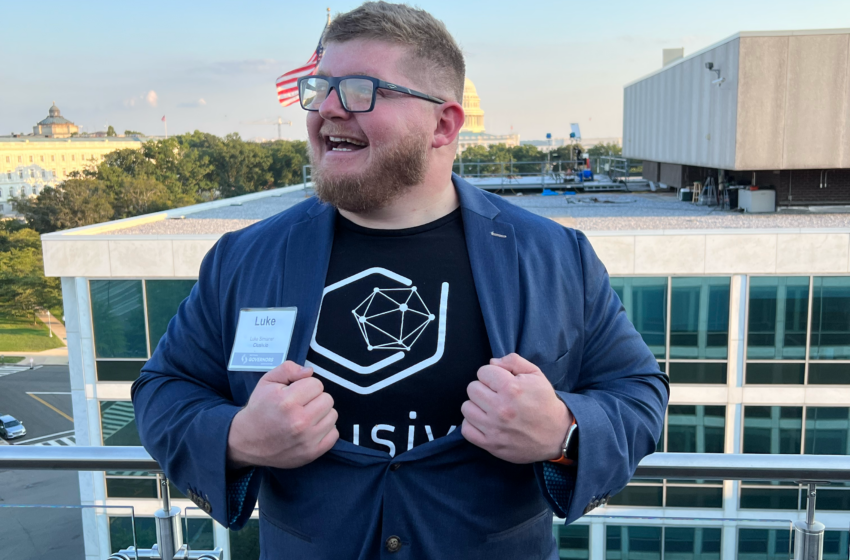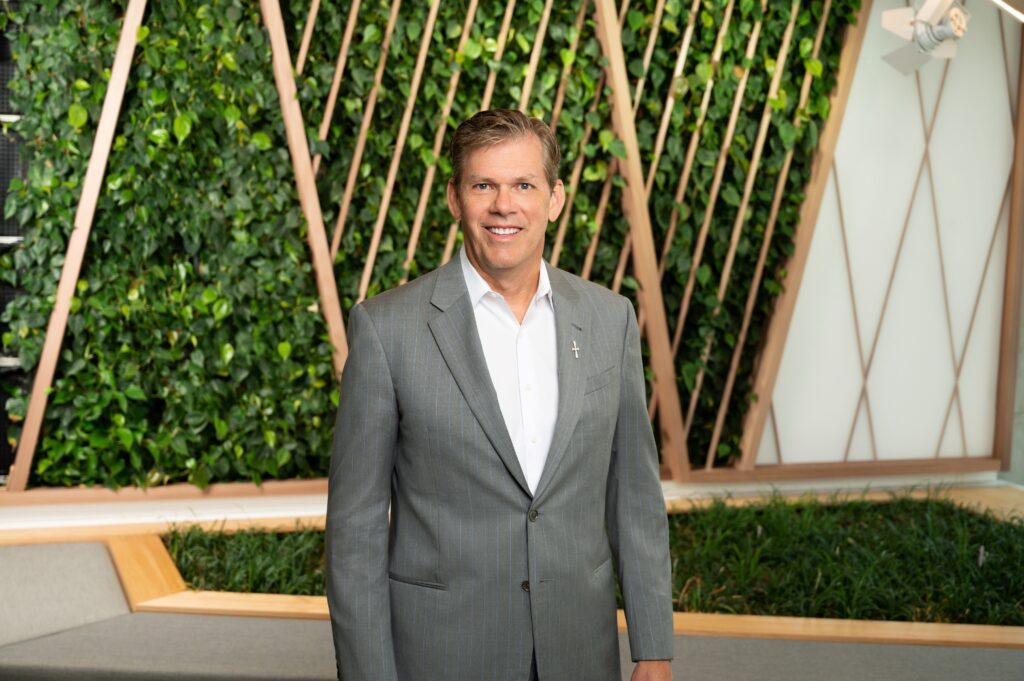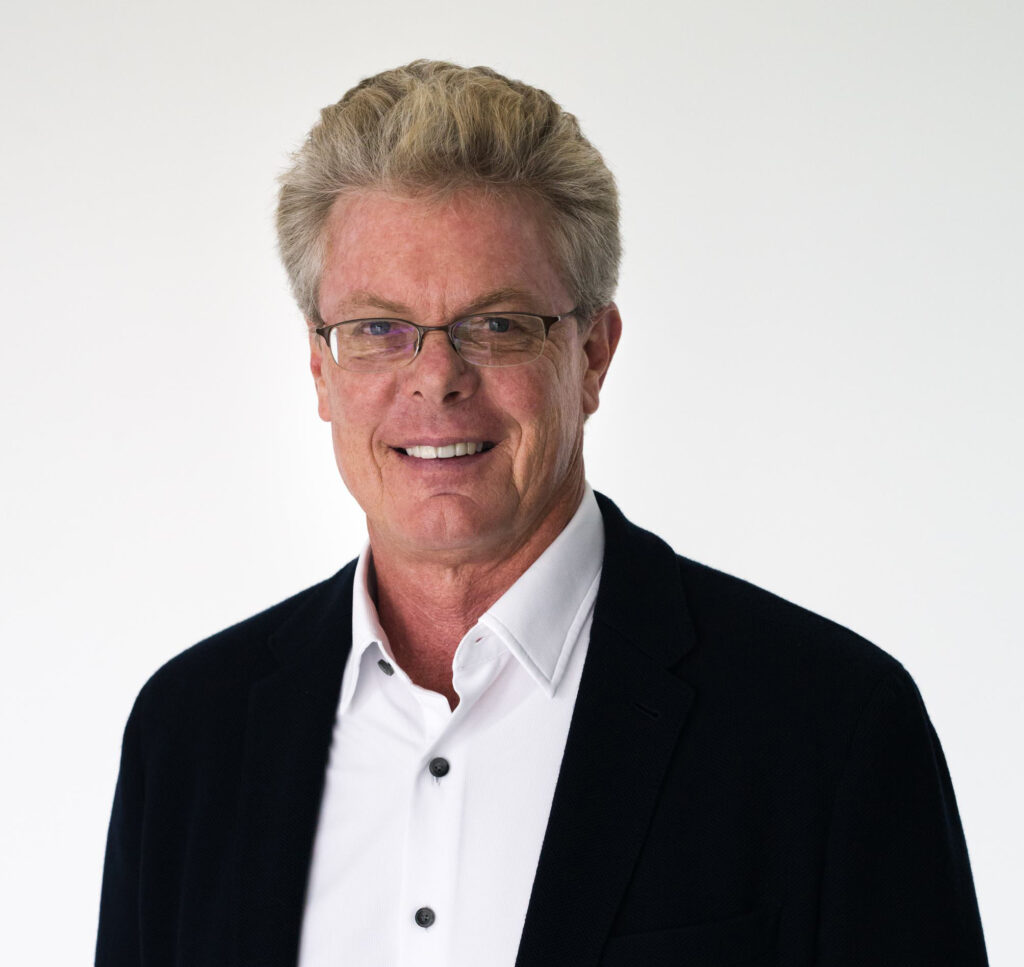Breaking Barriers
- August 1, 2023

Clusiv CEO and co-founder Lukas Simianer helps create a more inclusive workplace for the visually impaired.
It’s been two years, come May 17, since Clusiv CEO and co-founder Lukas Simianer launched his startup. In development for a little over a year, the e-learning software platform to train visually impaired individuals to use evolving workplace software went live in June 2022, and the company closed a $2.25 million seed round late last year. Not bad for a US Army veteran paratrooper who has struggled with dyslexia and direction for much of his life.
Simianer has been on a do-it-himself journey fueled by a desire to prove naysayers wrong and a desire to find what fits him best. Born to a single mom living in abject poverty, he was diagnosed with severe dyslexia at seven years old and relegated to a trailer behind his school where, he says, they put students they didn’t know what to do with. That was his K-12 experience and what prompted him to go into the military.
Now 30, Simianer has tried his hand at several careers. After he left the military, he was a cable guy and drove a cement truck. Then he started college, where he majored in construction management. The school canceled his major, so he started delivering propane and propane accessories, he says, referencing the quintessential Texas cartoon character, Hank Hill. It was at the propane job that he realized the holiday bonus wasn’t going to make him rich.
“It was a free Thanksgiving turkey and a $100 gift card, which is a big deal,” he says. “This guy who had been working at that company for 30-something years, in the break room, he was so ecstatic the next morning because he’s like, ‘Man, with this gift card, I want to buy my kid the new Xbox.’
“At first, I thought, that’s really sweet. Then it hit me. When I’m 50, I don’t want to be worried about $100. I have to change this, or this will be me. No discredit to him, but that’s not the life that I wanted to pursue.”
Simianer returned to college, but a meaningful major eluded him. He gained a degree in nursing because he had enjoyed the medical exposure he had through the Army but ultimately didn’t feel like it fit him. Then, about six years ago, after following a girl to Texas from Michigan, Simianer finally found his passion in the Lone Star State.
“I Googled the fastest way to make six figures without going back to college,” Simianer says. “I found that engineering and IT were the answers.”
The Google search landed him in a coding boot camp at the University of Texas at Austin, where afterward, he was the first in his cohort to be hired.
FEELING VALUED
At his first job in the tech field, Simianer says he struggled with imposter syndrome. Then, the company was sued with Title II litigation over accessibility to its online app. Simianer says he Slack-messaged the CTO and CEO to propose that he work with his stepdad, who was blind, to find the break in the application and fix the code to head off the lawsuit. Seven working days later, the multimillion-dollar lawsuit was mitigated. Imposter syndrome squashed.
But that wasn’t the end of it. Simianer’s stepdad had felt valued, and after the collaboration ended, he slipped into depression. “He tells me that he feels intellectually valued for the first time in his life,” Simianer says, “and it’s—insert 10,000 expletives—messed up that he is never going to get to feel that way again.”
Simianer didn’t want that to be his stepdad’s fate. “What do you mean? It’s America,” he remembers thinking. “You do whatever the hell you want! That was my take on it. That’s why I fought for this country. It’s what I believe in. I came from poverty. Now I’m an engineer.” He didn’t think blindness should be an obstacle to success either.
According to the National Industries for the Blind, nearly 70 percent of working-age blind Americans are unemployed.
“Why?” Simianer asks. “It’s not a capabilities issue. Being blind does not mean you’re dumb or slow. In fact, they oftentimes listen to speech at speeds that would blow our minds, incomprehensible to a sighted person, because they’ve trained that muscle in ways that we really couldn’t.”
FIXING THE SYSTEM
The disparity became a burr under Simianer’s saddle, and he realized how big the technology gap was for visually impaired people and how that contributed to their lack of opportunity.
Simianer started researching how the tech stack—the combination of software, technologies, frameworks, etc. used to execute a job—of the worker had changed in the last decade. In his research, he found that 10 years ago, the lowest-ranking employee may have only needed to know how to use email. Nowadays, the lowest-ranking person in an office knows email, Slack, cloud storage, Sheets or Excel, PowerPoint or Slides. They’re often using a CRM or customer service tool. While the tech stack had grown significantly, the training for blind individuals to stay up to speed had not. Additionally, 82 percent of employers in a recent Indeed survey said they conducted interviews virtually. Simianer found that most states lacked the ability to meaningfully train blind individuals on how to use digital meeting platforms for a digital interview.
That’s where the inspiration for Clusiv surfaced, to remove technical barriers in the modern workforce for those individuals.
To date, Austin-based Clusiv’s e-learning software is active in vocational rehabilitation programs in 16 states. Canada, Australia, and the UK’s Royal National Institute of Blind People have expressed interest, and Clusiv is actively working with the German Innovation Council, which is looking at incorporating Clusiv into its government-wide human resources platform. It’s free to individuals through these programs, but the company is working on a subscription-based direct-to-consumer app as well.
Simianer’s vision for the future of Clusiv includes adoption in all 50 states and to have enough aggregate data to present it to the federal government in a meaningful way to solve this issue. Then he has his sights set on secondary education to head off the need for vocational rehab as a backup for blind and low-vision people when schools are not accessible for them.
“We want to get into K through 12 and defeat all of that,” he says.
How did your military background and your challenges with dyslexia prepare you for your role as an entrepreneur?
Every single step in my life prepared me for this. You couldn’t have made a better recipe if you were making a cake, at least for this company. I’m not saying my life made me the best CEO ever. That’s probably very far from the truth. But did it make me the right CEO of this company? Yes, it did.
My adversity background as a child taught me that when you start out that poor, you’re not really scared of losing it at all because you’ve already built it up once. When I left my high-paying engineering job to live off ramen and build a thing, knowing it would take years to get off the ground, I didn’t have to operate out of fear or out of stress.
In the military, there’s this deep-down level of discipline where you know that it’s going to be absolute BS for the next year. You just accept that and find fun on the hardest days. You crack jokes. You have friends. You do the thing. You get by.
Then there’s delayed gratification, of course. That’s life teaching you that it’s sour grapes for now but turns into wine in somewhat short order.
Dyslexia was a learning style. By all means, I was dumb in school. Not that I lacked intelligence, but I lacked the ability to work because I didn’t know how to teach myself. In community college, I’d show up to lectures; I would get the material, and I’d teach myself.
When I started doing product research and engaging with blind individuals daily about how they absorb information and how something made sense to them or how it didn’t, I found it was similar to dyslexia. I have a hyper-visual way of doing things, but visually impaired individuals want it parsed in a unique way that fits how they absorb and learn things.
How has being intellectually valued by a company you worked for changed your life?
There are two employers that changed my life.
The first was a concrete company. I was young, but they trusted me with the autonomy of driving this million-dollar vehicle that could kill me and other people. You go to a job site. If you back over a house’s foundation with that heavy truck, oh boy. People don’t realize it, but it’s very easy to do horrendous things in that job. No one questioned me for my age. They’re just like, “Hey, Luke’s squared away. He’s good to go.” That gave me confidence; it’s why I wanted to go into construction management.
The second one was that first engineering job because I knew I wasn’t as good, but there was faith that I was going to get there. They were giving me more and more tasks, some of which they knew I couldn’t handle on my own, but they wanted to see how I reached out to people. They gave me autonomy. They gave me the rope to hang myself with or climb up. I climbed.
I try to do the same thing in my organization. I give people challenging tasks to do, and I know I’m going to get a call about it in a day—and that’s a good thing. It gives people the autonomy to just do it.
That’s our company culture. We put it in our job descriptions, and it scares some people away. But what I call it is the “autonomous hunter-killer.” I don’t want to know—because I don’t have time—how you’re doing it. Your job is to understand the commander’s intent and bring food back to the table in your facet of the job.
Have you seen the Clusiv training affecting the way employers are hiring visually impaired people?
It’s a little early for us to have meaningful data for two reasons. The first is the data we’re really trying to quantify, because if you could quantify a gain of agency, Clusiv would be the MVP all-star. We’ve got plenty of reviews that can pull tears out.
What we’re working on now is trying to get some of the biggest employers in the game, the ones that can afford to take, as they view it, a risk and get them to hire our graduates. That’ll take time because it’s a chicken-or-egg thing. We’ve had to build up the talent pool, which we’re still doing, and then get the employer to say, “Well, out of these 30, 40 people, who are we going to hire? Who’s the best fit?”
Have any of your program graduates been placed as accessibility analysts at any bigger companies?
Two of them have, not at big companies, though, but at others in the small and midsize range. The thing is, we’re fighting for a societal shift in perceptions and knowledge. Right now, big companies use these disparate quality assurance teams. They might have an accessibility analyst as part of their natural organic engineering team, but then they have a firm that checks their accessibility, a firm full of sighted people. Accessibility does not equal usability.
So, they’ve got multiple barriers between what matters and what they think they’re doing. It costs them money when those firms say something’s not accessible. Then the most expensive engineers at Google, making $500,000 a year, have to figure that part out.
If you had a blind individual as part of your team—we’re talking one $70K position, which is far cheaper than that consulting firm—you get real-time feedback on every feature you write. It’s a better process. So, we’re fighting for a societal shift and a tech shift.
You’ve said that in a startup, every hire matters. Can that same thing be said for bigger organizations, that these kinds of hires matter?
It’s part of that same conversation, talking about diversity as well and how so many businesses and companies view diversity as race, ethnicity, religion, or LGBTQIA positions, but they don’t really think about a visually impaired or a blind employee being a diversity aspect.
We’ve had some cool talks with—leave it at this—the biggest bank in the world saying, “Yeah, this is really exciting. We’re working with you on this.” Because there’s finally an action component to it, not just talk. That’s not me hating on people. We have something where if you come and listen to me talk, you can leave the room with an actionable way to change the culture in your company.
Clusiv is 70 percent blind or low-vision employees. They’re some of the hardest-working, dedicated, diligent, creative individuals, and incredibly communicative too. I have my team of autonomous hunter-killers, and most of them are blind.
What does a company’s leadership get wrong when it comes to hiring visually impaired employees?
There’s been a lot of diversity-for-the-sake-of-diversity talk. You need DEI because you need DEI, and if you ask why, you’re wrong.
That’s a cultural thing that’s happened, and people have gone with the status quo. Now that budgets are getting tight, businesses are tightening everything up. You really have to demonstrate where diversity and inclusion increase your bottom line. That is what they miss with the blind population so much.
One anecdotal example is: A company with a five-page website could pay upwards of half a million dollars to have the accessibility remediated and quality assessed, and that doesn’t even get them to be truly usable. Compare that cost with having two to three blind individuals who they hire at $60K to $70K a year to just be a part of their product team. That’s a huge way to increase the bottom line and decrease spending. But a lot of what’s missed is the factors among DEI that improve the bottom line.
How would you recommend CEOs think about this issue in terms of that?
The first question I would ask any CEO is: Is there a market out there that you’re missing purely because you’re not accessible? There are 7.6 million blind and low-vision Americans, and that’s just one of the many disabilities. So, if you’re missing them, how much money are you missing? How much would you pay a marketing specialist to come in and get you that much more reach? Quite a bit.
The other way to look at this is: What problems in our company could be solved by someone who has a different lived experience? When we talk about improving the user experience of a super complicated app, having a blind person make that navigational flow accessible and saying it makes sense to them means that no matter who your user is, they’re going to have an improved experience.
How would you define your personal leadership style?
Aggressive. I am aggressively caring. I’m tenacious. My team knows I’ll go to bat for them any day of the week, but the standards are also incredibly high. I expect everybody to perform and communicate at the top of their capability as often as possible. That sounds mean, but it’s in a good way.
Who or what has had the biggest influence on your leadership style? Where did you develop your approach?
The Army. Not in the sense one would think. I had a lot of unfortunate leadership in the military and few good leaders. The biggest differentiator was that the good ones were the people you didn’t want to let down because you knew they had your back. That’s who I always strive to become, someone who communicates, is honest, transparent, and you know where you stand.
How do you think your employees would describe your approach? Do you think you differ from a typical CEO in any way?
I think that in most companies that have gotten to our size, the CEO starts to get more distanced from some functions and starts to look at whiteboards and numbers and play chess. I like to say that I’m in the trenches, but I still have my head up high enough that I can understand the full lay of the field. My leadership style can be intimidating at first, but I look at my employees as a holistic part of the team. Are you okay? If you’re good, then let’s get to work.
What mentors or role models have been important to your career and what did you learn from them?
Taylor McLemore was the managing director of our Techstars cohort, and I’d say he was probably my first big role model/mentor in a positive way. I learned the power of communication from him, the power of uncomfortable communication. In startups, for the first while, it’s a power struggle. People are inherently uncomfortable at every stage. Your first three employees—when you hire the second three—they worry that their jobs are in jeopardy. Or, how do we divvy these duties?
The other one was—I’ll leave him unnamed—but he’s a previous founder. He’s a really respected dude out of Houston, but he brought me into a company as a fractional CTO. Everybody else he hired had an Ivy League background, and I’d never experienced this before. Ultimately, I ended up quitting and writing an open letter. I learned that you could have all the brains and intellect in the world, but if you don’t have a group of people that’s willing to be wrong, then you don’t have anything.
What’s the best leadership advice you ever received?
Complacency gets you killed. Complacency—it sounds more like it’s on a battlefield, but if you’re not reading, working out, bettering yourself, taking care of you, and doing the things that make you better as a leader, you’re going to get outpaced because someone else wants that job and someone else wants that money and wants whatever it is that you’re going after.
What advice would you have for someone who hopes to be a CEO someday?
Learn that faith is all that matters, and that’s not in a religious context but faith in yourself. If you have the willpower to stay the road, you will make something of it or be taught “why not” and then have a skill set to go do something else.
Is there anything else that’s important to your or Clusiv’s journey to date?
That’s a big question. Our mission statement is to reduce the net amount of suffering in the world. We will innovate. I will lead a team of many to act as one on the mission of reducing the net amount of suffering in the world.
We’re trying to get into schools and trying to make this better. It’s not one product or one stream. It’s how do we create an ecosystem solution to get this population off the ground? Because if we do that, deafness has the same kind of staggering statistics.
So, one by one.
Lightning Round
Who is your most admired fellow Texas CEO?
Elon Musk. It’s his unwavering willingness to do what he thinks is best, knowing he may well be wrong and wrong at such a scale that the whole world knows.
What’s something you’re afraid of?
Losing the love of what I do, getting so big that it no longer feels like a fight.
What would surprise people to know about you?
I have a tattoo of Where’s Waldo.
What’s your can’t-live-without-it technology?
Internal combustion engines. I like driving.
How do you start
your day?
Reading.
What does success look like for you?
Success looks like maximizing the potential that I have as a CEO, founder, and human, and reducing the net amount of suffering in the world through my actions in my company.






